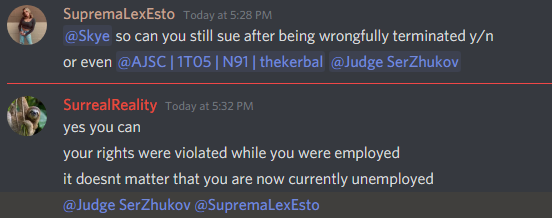No comment
Goddamn, Surreal, get online for FFA sessions!
1B you just referred to it as “Section 1: B”… the subsections are part of the section. just because i chose to separate them into a readable format doesn’t mean they’re now part of some elusive concept known as a “subsection” but are somehow not included in a “section”
2A does apply to commerce. read it like a paragraph.
Any citizen of Firestone so currently employed, whether employed in an officially recognized government department(s) or a private business(s) officially licensed by the Department of Commerce
No employee shall, through contractual means or otherwise, waive their right
section 4 no, amendments do not require executive consent, only that the department be informed. in which case, if the amendment is stupid, my hope is that 1. dept heads will be less likely to do it if they know it has to be public and 2. people will complain to the governor if it’s a bad amendment. the governor approves entire handbooks so if it’s obvious a dept head is trying to screw over their employees, the governor will presumably not approve the handbook.
4C in lieu of an official legal definition, dictionary definitions have been used in the courts. any definition of “investigation” should work just fine. the reason i included this “cumbersome” clause is because employees under investigation for unprofessionalism or something similar should know & have a chance to clean their act of. the
4D is a definition of “administration”, not of “disciplinary”
4F …departments can only punish people for things that are against the rules and regulations, and when they do punish people, they must follow their own guidelines set out for violations of such rules. i’m not sure what you’re alluding to here. the department is the liable party–the employee is seeking redress. i would think that was obvious.
4G they are taking the department to civil court to appeal the punishment. civil appeal.
section 5, ok
section 6, regardless of what dps may hand down, it’s always ULTIMATELY the hands of the department staff that impose the disciplinary action.
I would agree with you if you put A. and B. but you explicitly decided to put 1A. and 1B.. You can say whatever your intent is but the way people interpret is what matters.
‘Employee’ is already defined as an employee of a government department in Section 1. And seeing as 2A. is cut off from Section 2, the initial definition is not likely to pass on. Also, Section 2 does not redefine ‘employee’ but simply uses the term ‘employed’.
Ah yes nice but what is a good idea is not the concern here. The Act is not clear enough on whether amendments should constitute “shall first be approved by the Governor” or not.
Yeah but isn’t the point of this law to clear ambiguity… the courts have ruled erratically in the past and using Oxford Dictionary for legal principles isn’t great. Also, I don’t know what Congress wants but isn’t the major concern with the old law the problem with ‘investigation notices’ being required for however minor an investigation?
The issue here is that you defined ‘regarding punitive or disciplinary measures’ to include “terminations, strikes, suspensions, promotions, hirings, or other measures affecting employees’ general rapport” in Section 4A, regardless of whether it was the component of another definition. Although I must say I did somewhat read it incorrectly but the point still stands that the Act includes these acts to be ‘punitive or disciplinary measures’ and disciplinary measures require a right to provide a defense. Once again, maybe it won’t hold up in court but the general gist of the law is just vague
What I was saying is that ‘standard disciplinary system’ isn’t properly defined although it can be interpreted. And no, it’s not ‘obvious’ anywhere in law who is liable as the prior employment rights allowed both the liable department or the liable employer (/ administration) to be sued in civil court, while here it isn’t specified whatsoever.
A ‘civil appeal’ can definitely mean an appeal to the Supreme Court based off of a civil case, and now a new term has been added in the mix while it has already always been ‘challenge’ and not ‘appeal’, which could cause confusion but it doesnt really matter I guess
Alright, but you do see the infinite loop that it creates? If DPS PSBs someone in a LEA and the LEA subsequently is forced to terminate them, then the employee sues the LEA as they – under this Act – probably can’t sue DPS but the LEA uses the viable excuse that employees with a PSB must be terminated (in the rules and regs) and therefore any termination on the basis of a PSB can’t be overturned? Idk if you guys want that, but that’s how it (approximately) is atm
I’m no legal expert but I believe the department. DPS doesn’t terminate, they tell the department to. If it is proven false, they’ll probably have it so dps has to like overturn it
or sum
DPS orders terminations (EDIT) after finding an individual has broken DPS or Departmental policy, which the department is responsible to make sure all employees are in line with at all times, DPS doesn’t terminate employees themselves.
SECTION 2B: The Firestone Department of Public Safety may fire any employee of any department the Firestone Department of Public Safety has jurisdiction over; as long as they are not the department head of the department in question, and a message to the department head has been sent concerning the termination.
uh i dont think so. might have been in an old bill. but
SECTION 3: Before terminating an employee of any department affiliated with the Department of Public Safety, the Secretary of Public Safety is required to attempt to speak to the department head beforehand to see if they have any objections with the termination.
neither of those sections are in my bill so im confused at what you’re asking me here
Firestone: Has complaints about employment rights bill.
Also Firestone: Doesn’t contact congress to address their concerns.
Again, also Firestone:
sorry kerb, Idk why this replied to you. Meant to reply to the main thread)
none of the complaints are valid.
doesn’t understand even though it doesnt say “former employees” you can still sue even after being fired if unlawful, or any disciplinary action.

people who are organizing the protest and spreading the lie are uneducated beings
im replying to him…
The courts shouldn’t be carrying out duties related to the internal affairs of employers. Like I said, in my opinion, the only things that should be going to court are matters arising under law or the constitution of this state. An employment rights case should only occur if some right or law was violated in the process of punishment which would activate reasonable judicial intervention.
Just amended it so there is no confusion…
Ok cool I was talking about the fact that it’s called a ‘civil appeal’ for some reason
This topic was automatically closed 14 days after the last reply. New replies are no longer allowed.
